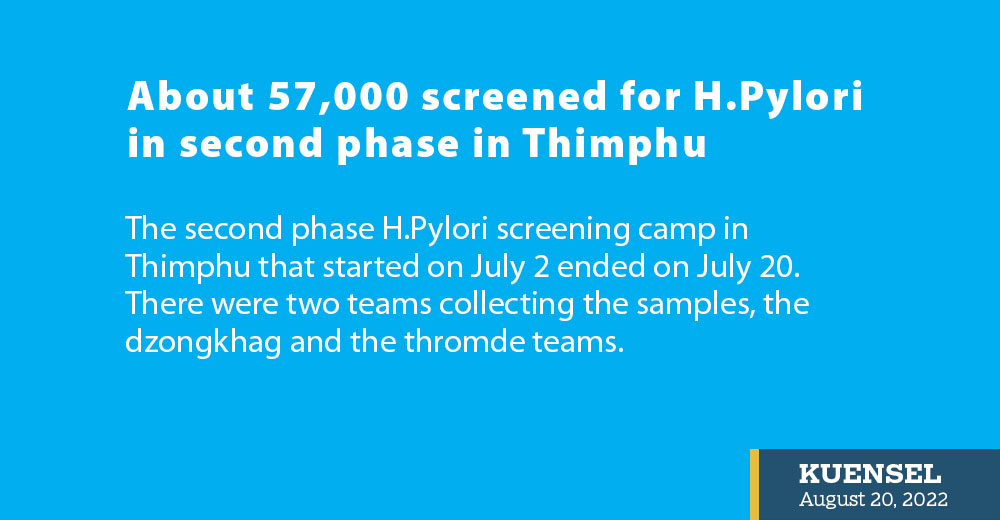Nima Wangdi
The second phase H.Pylori screening camp in Thimphu that started on July 2 ended on July 20.
There were two teams collecting the samples, the dzongkhag and the thromde teams.
The Thromde team collected 47,661 samples with 19.97 percent positivity rate. The Dzongkhag team collected 8,994 samples with 30.78 percent positivity.
Thromde team achieved 99 percent coverage, while the dzongkhag’s was 90 percent.
Health flagship programme manager, Pempa, said that the screening programme is ongoing in Samdrupjongkhar, Chukha, Samtse, Lower Zhemgang, and Gasa. “Catch up camps are underway in other dzongkhags where they check if the treatments have been successful.”
The camps are also followed by endoscopy services for those who are 40 years and older and those who tested positive for H.Pylori.
Pempa said that those who have not tested positive but have other symptoms and cancer history in their family are also given the service.
The programme has been completed in Tashiyangtse, Lhuntse, Mongar, Bumthang, Wangude, Punakha, Haa, Paro, and Sarpang.
It is ongoing in Trongsa, Pemagatshel, and Trashigang.
Pempa said that endoscopy programme would start in the southern dzongkhags after the screening programmes.
Cervical and breast cancer screenings are also underway in different dzongkhags.
Tashiyangtse, Trashigang, Lhuntse, Wangdue, Haa, Pemagatshel, and Zhemgang have already been covered.
Pempa, in an earlier interview, said that women who test positive for Human Papillomavirus (HPV), which is the leading cause of cervical cancer, are given the required treatment.
He said that breast cancer examinations are only for women aged between 40 and 65. “If anyone is found with the risk of developing breast cancer, the person is provided with further examination and treatment like mammography.”
People doubt test results
Meanwhile, a man living in Thimphu, said that he had given his sample in December last year but was surprised to know that he had tested positive only when he went again with the sample this July.
He doubted the result and went back with the sample. The health official who was punching CID number told him that he had already tested positive.
Another woman, Dechen, who gave a sample last July, said that she has doubts about her result since she eats a lot of chilli and also chew doma. “I called up the toll-free number but no one has responded so far.”
She said that if the health officials are going to miss contact number of the patients in the process of making calls, submitting samples is useless. “The patients may have tested positive and still be left untreated.”
Pempa said that the health officials are supposed to call the people if they test positive. “If a person tests positive and complains to have not received the call, it could mean the person missed the call or the health officials missed to call.”
The campaign, which started in 2020, is part of the government’s health flagship programme.
According to Pempa, the camps are aimed at detecting early and pre-cancer cases that can be treated.
He said the people should come for screening when the service is being taken to their doorsteps. “The screening is expected to be complete by 2023.”
H.Pylori bacteria are one of the main causes of stomach cancer. People in the age group of 18-75 should get tested, according to health officials.


